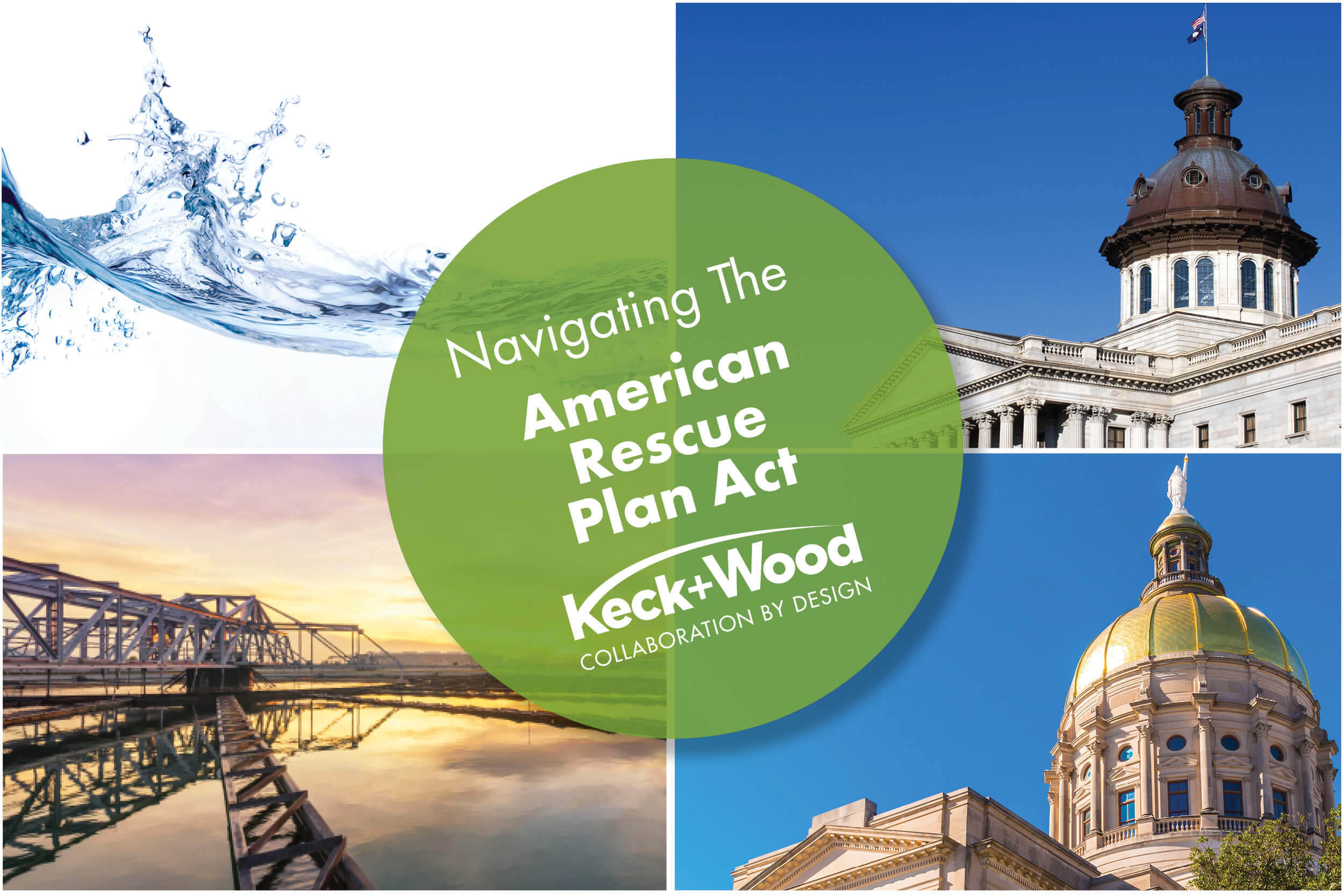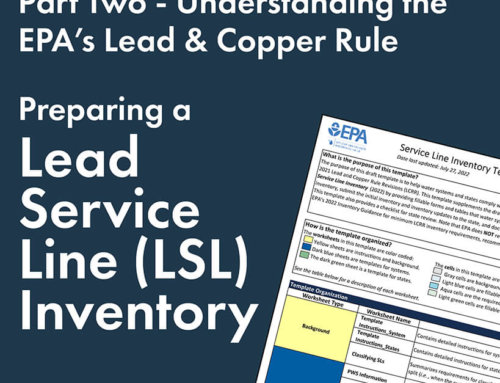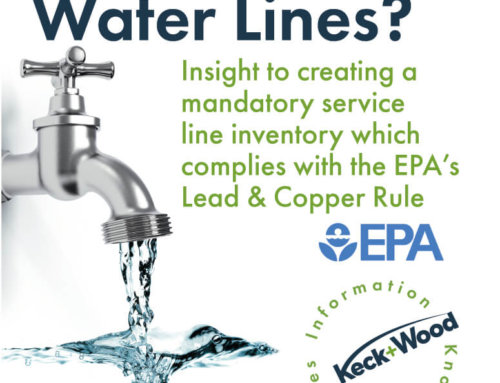The American Rescue Plan Act provides opportunities for communities to obtain funding to help reverse the devastating economic effects of COVID.
While the bill provides assistance for many different avenues for local governments to firm up and bolster their workforce training, education, broadband, and small business support; the act also provides the opportunity to invest in water-related infrastructure projects. These projects can include constructing publicly owned treatment infrastructure, managing and treating stormwater or subsurface drainage water, facilitating water reuse, and securing publicly owned treatment works. Certain ARPA funds can also be used for drinking and clean water-related infrastructure projects that are not necessarily associated with COVID.
How Can Funds be Allocated to Infrastructure:
Many cities across the nation are receiving large quantities of funding from the US Government, but not all know exactly how to utilize this resource. As published by the Georgia Municipal Association (GMA), and US Congress, the following represents a fraction of engineering projects that can be completed with ARPA funds:
- Clean-up of wastewater holding ponds
- Private/public partnership with internet service provider, county, school system, and healthcare for comprehensive broadband connectivity
- Replacement of asbestos and lead water distribution lines
- Replacement of utility meter system with AMI system for consumption management and cost control
- Replacement of water meters and handheld readers
- Replacement of water pumps at treatment facilities
- Revenue replacement (including for projects related to parks, sidewalks, etc.)
- Sewer facility upgrades
- Solid waste disposal related to PPE
In addition to larger metropolitan areas, the Coronavirus Local Fiscal Recovery Fund will provide $19.53 billion to support tens of thousands of non-entitlement units of local government, which are local governments typically serving a population under 50,000.
Timing is Everything:
The timing of these funds is already upon us: Local fiscal recovery funds will be paid to local governments with the first 50% available now, and the second 50% to be delivered 12 months later. Initially, this timeline seems generous, but take into account the amount of time a local government needs to identify an infrastructure issue, run it through its approval process, then prepare for engineering and/or construction bidding; and the timing doesn’t seem overly generous.
Additionally, any funds not obligated by December 31, 2024 or expended by December 31, 2026 will need to be returned. It would be a difficult explanation for any municipality to its citizens on why improvement funds went unused.
Fund Distribution in the State of Georgia:
“More than $17.4B in ARPA Local Fiscal Recovery Funds are allocated for the State of Georgia.”
– Georgia Governor’s Office for Planning & Budgeting
According to the Georgia Governor’s Office of Planning & Budget (OPB), the Coronavirus State and Local Fiscal Recovery Funds may be used to invest in necessary improvements to water and sewer infrastructure. Currently 23 Metropolitan Areas have been identified to receive a share of the $17.4B in funds allocated for Georgia.
| Municipality | ARPA Funding |
|---|---|
| Atlanta | $170.93M |
| Savannah | $55.59M |
| Macon-Bibb County | $46.12M |
| Columbus | Muscogee Cty. | $40.46M |
| Athens – Clarke County | $32.63M |
| Albany | $20.04M |
| Valdosta | $16.25M |
| Warner Robins | $15.02M |
| Sandy Springs | $13.87M |
| Gainesville | $11.71M |
| Rome | $11.55M |
| Roswell | $11.37M |
| South Fulton | $11.35M |
| Marietta | $11.18M |
| Stonecrest | $9.73M |
| Brunswick | $9.21M |
| Dalton | $8.88M |
| Brookhaven | $8.48M |
| Smyrna | $7.99M |
| Johns Creek | $7.07M |
| Alpharetta | $6.64M |
| Hinesville | $6.57M |
Non-entitlement Units of Local Governments (NEUs) are the remaining municipalities (generally all cities under 50,000 in population). NEU’s have to apply to the US Treasury for assistance which may not exceed 75% of their most recent budget.
How Can a Georgia Municipality Apply for Funds?
The grant application process will require a proposal narrative for Water/Sewer Infrastructure, Broadband Infrastructure, and Negative Economic Impact projects. Visit the Georgia Governor’s office for Planning & Budgeting website at www.opb.georgia.gov.
The application period for the State of Georgia Fiscal Recovery Funds will be August 1-August 31, 2021. Applicants can apply via the Georgia Grants Portal.
For Non Entitlement Units of Local Government (NEU’s) there is more application information found on the US Treasury website: Coronavirus State and Local Fiscal Recovery Funds for Non-entitlement Units of Local Government | U.S. Department of the Treasury
Fund Distribution in the State of South Carolina:
“Accountability on every nickel we spend, every penny no matter where it comes from, is to be a top priority. This is a lot of money. We don’t want to waste it, for sure. We don’t want to misspend it.”
-Henry McMaster – Governor, South Carolina
Overall, $8.8 billion is expected to come into the state of South Carolina through ARPA, but the majority of that funding will be sent directly to local and county governments and specific state agencies. As per the Post and Courier Newspaper | National League of Cities, local South Carolina metropolitan areas are directly receiving the following funds:
| Municipality | ARPA Funding |
|---|---|
| North Charleston | $43.09M |
| Mouth Pleasant | $34.24M |
| Columbia | $25.93M |
| Charleston | $20.71M |
| Greenville | $19.66M |
| Spartanburg | $16.92M |
| Goose Creek | $16.31M |
| Anderson | $15.75M |
| Rock Hill | $13.24M |
| Myrtle Beach | $12.96M |
| Greer | $12.46M |
| Mauldin | $9.49M |
| Simpsonville | $9.05M |
| Fountain Inn | $3.90M |
| Travelers Rest | $2.00M |
In addition to the local funding, South Carolina officials are determining how to best use the remaining funds. In an article released by The Center Square | South Carolina, some ideas being considered are:
- $600 million in broadband and fiber improvements
- $350 million to complete projects at the Port of Charleston and at inland ports to allow for an estimated 175,000 to 250,000 truckloads of imports to move from ships to the railways
- $36 million to continue the state’s workforce training program, aimed at getting those unemployed back into the workforce
- $10 million on a dashboard that would allow anyone to access data on how students at a school are faring throughout a year
- $50 million nonprofit relief program and a program to add funds to emergency disaster farm aid and matching infrastructure grants to allow companies to build facilities to produce more products from the raw materials grown in the state
- $15 million for beach re-nourishment with the funds
How Can a South Carolina Municipality Apply for Funds?
- Visit the South Carolina Department of Administration website. Budget | Department of Administration – State of South Carolina (sc.gov)
- For Non Entitlement Units of Local Government (NEU’s) there is more application information found on the US Treasury website: Coronavirus State and Local Fiscal Recovery Funds for Non-entitlement Units of Local Government | U.S. Department of the Treasury
Additional ARPA Resources:
With such a large law literally sweeping the nation, there are many different resources to review and gather data from. Listed below are a few of the resource we have reviewed:
Nationwide Information:
The U.S. Department of the Treasury website has the latest information regarding the broad-based usage of the ARPA funding across the nation. There is also valuable information for non-entitled Units of Local Governments (NEU’s) to apply for funding.
To read the entire bill as signed into law, Congress.gov website has the official H.R.1319 – American Rescue Plan Act of 2021 available.
Municipalities – Specific Information:
The National League of Cities (NLC) website offers a robust section of searchable documents relevant to municipalities and local leaders in this historic legislation including:
- Local Recovery: Five Principles for ARPA Implementation
- ARPA Local Relief Frequently Asked Questions
- How to Spend Coronavirus State & Local Recovery Funds
- How to Use ARPA to Access Coronavirus State & Local Fiscal Recovery Funds
- How to Meet Reporting Requirements for Coronavirus Fiscal Recovery Funds
- How States Can Allocate Coronavirus Fiscal Recovery Funds to Local Governments
- How to Use Coronavirus Fiscal Recovery Funds to Ease Budget Shortfalls
Your Keck + Wood Team of Experts
Such an influx of funds to municipalities means work in progress, or projects recently put on hold due to the pandemic, can now begin. However, for many governments there is an issue of how to properly utilize the funds.
For specific insight on utilizing the ARPA funding for water and wastewater improvements, Keck + Wood can help. We can work with you to identify potential uses through facility assessments, plant optimization studies, and other planning methodologies to help prioritize the best use of the funding to serve your constituents. To learn more about how we can assist in the best use of ARPA infrastructure related funds, please contact:
Mike Moffitt, PE | Senior Vice President – Utilities
678.417.4030 | mmoffitt@keckwood.com
Sam Serio, PE | Vice President – Community Development
678.417.4023 |sserio@keckwood.com
Using this Information:
At Keck + Wood, we continually strive to provide accurate and timely information. However, with ARPA information being generated and shared by many different sources almost daily, we cannot be held liable for the accuracy of this information.
You can download our Navigating the American Rescue Plan Act 2021 PDF for further reading.







Leave A Comment